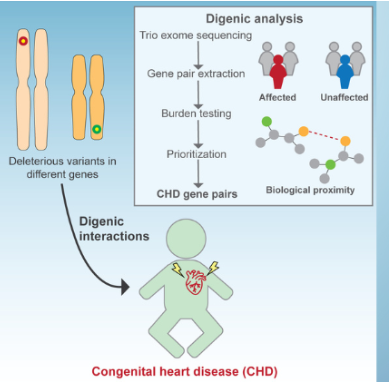By Joke Kujenya
HIDDEN GENETIC factors behind congenital heart disease have been uncovered, offering crucial insights for the global healthcare sector.
Scientists at the Icahn School of Medicine at Mount Sinai in New York City, in collaboration with international researchers, have identified novel genetic interactions that contribute to this common birth defect.
Their findings, published in the February 20 edition of The American Journal of Human Genetics, highlight the role of digenic inheritance—where two genes work together to cause disease.
This discovery marks a significant advancement in understanding the genetic basis of congenital heart disease, they intoned.
“Our research reveals the potential for digenic inheritance, expanding our understanding of the genetic underpinnings of congenital heart disease,” said Yuval Itan, PhD, Associate Professor of Genetics and Genomic Sciences at Mount Sinai and co-corresponding senior author of the study.
He is also a core member of The Charles Bronfman Institute for Personalised Medicine and The Mindich Child Health and Development Institute.
Itan co-supervised the research alongside Bruce Gelb, MD, Gogel Family Professor and Director of The Mindich Institute.
“By identifying these gene pairs and their combined effects, we uncover previously hidden genetic risks, which could improve diagnostic precision and open new avenues for personalised treatment strategies,” Gelb stated.
Congenital heart disease remains the most common congenital anomaly worldwide, affecting millions, with more than half of cases still lacking a molecular diagnosis, according to Science Daily.
The research team analysed trio exome sequencing data from affected and unaffected children in the Pediatric Genomic Consortium (PCGC), identifying 10 novel gene pairs potentially linked to CHD development.
“Our work demonstrates that genetic interactions, rather than single-gene causes alone, could play a significant role in congenital heart disease,” said Meltem Ece Kars, MD, PhD, a postdoctoral fellow at The Bronfman Institute and first author of the study.
“By developing a method to uncover these interactions, we are broadening the scope of genetic research, which could lead to improved diagnosis, enhanced risk assessment, and more informed genetic counselling.”
The scientists also adds that as clinical genetic testing advances, incorporating digenic models could significantly improve diagnostic accuracy, offering patients and their families greater clarity about their condition.
Overall, the study’s computational approach has the potential to transform genetic research in complex diseases, providing deeper insights into the role of genetics in disease development, they submitted.





